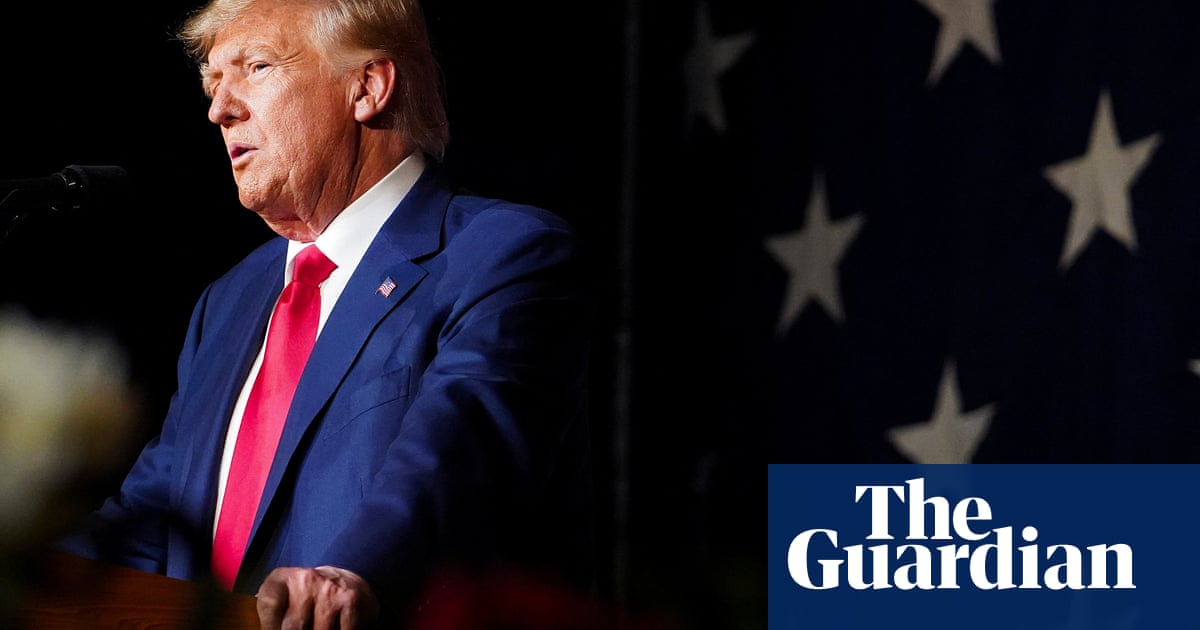
Donald Trump speaks at the Georgia Republican party convention in Columbus, Georgia, 10 June 2023. Photograph: Megan Varner/Reuters
Georgia
Explainer
What is Trump charged with in Georgia and what is the case about?
Trump and his allies made an aggressive push to invalidate the election results in Georgia as part of an effort to overturn results
Sam Levine
Tue 15 Aug 2023 04.14 BST
Donald Trump has been criminally charged by the Fulton county district attorney for his efforts to overturn the 2020 election in Georgia.
Prosecutors brought numerous counts against Trump and his associates, including forgery and racketeering, violating an oath of office and other charges. Prosecutors charged 18 other people, including Mark Meadows, Trump’s former White House chief of staff, and the lawyers Rudy Giuliani and John Eastman.
The charges mark the second time Trump has been charged in connection to his push to overturn the will of American voters after losing to Joe Biden in 2020.
Unlike the federal charges filed by Jack Smith, the special counsel for the justice department, the Fulton county case will proceed in state court. That means that Trump could not interfere with the case if he is elected president next year, nor could he pardon himself.
What is this case about?
Donald Trump lost Georgia in the 2020 presidential election. After the election, Trump and his allies made an aggressive push to invalidate the election results in Georgia as part of an effort to overturn the election results.
On 2 January 2021, Trump called Brad Raffensperger, the Republican who serves as Georgia’s top election official, and asked him to overturn the election. “All I want to do is this. I just want to find 11,780 votes, which is one more than we have because we won the state,” Trump said to Raffensperger on the call. Raffensperger refused.
The call came as Trump and allies, including Rudy Giuliani, were spreading outlandish lies about the election in Georgia in order to seed doubt about the results. Most notably, Giuliani and others amplified misleading surveillance video from State Farm Arena they claimed showed election workers taking ballots out from under a table and counting them after observers left for the evening. The claim was false – counting had not stopped for the evening when the ballots were tallied.
Just as he did in other swing states, Trump convened a slate of fake electors in Georgia. The group of 16 people met discretely in the Georgia capitol in December 2020 and signed on to a certificate affirming Trump’s victory that was sent to the National Archives. Some involved in the scheme have said they merely believed they were preserving Trump’s options amid pending litigation. The alternate slate of electors, both in Georgia and elsewhere, would later become a lynchpin of Trump’s effort to overturn the election.
Georgia prosecutors charge Donald Trump and several others with election interference crimes – live
Read more
One of those fake electors, Cathy Latham, also was involved in a separate incident in which Trump allies obtained unauthorized access to Dominion voting equipment. On 7 January 2021, Latham helped a firm hired by the Trump campaign get access to voting equipment in Coffee county, a rural county 200 miles south-east of Atlanta. The data was uploaded to a password-protected site, where other election deniers could download it as they sought to prove the baseless allegation that Dominion voting machines had been rigged and cost Trump the election.
Why is this case taking place in Fulton county?
Nearly all of the key events connected to Trump’s effort to overturn Georgia’s election results took place in Atlanta, the state capitol, which is in Fulton county.
Raffensperger was in Atlanta when he received the phone call from Trump urging him to overturn the election results. Trump and Giuliani targeted election workers in Atlanta and the fake electors convened at the state capitol in the city in December of 2020.
What is the Georgia Rico Act?
Georgia’s Racketeer Influenced and Corrupt Organizations (Rico) Act essentially allows prosecutors to link together different crimes committed by different people and bring criminal charges against a larger criminal enterprise. The law requires prosecutors to show the existence of a criminal enterprise that has committed at least two underlying crimes.
Prosecutors have long used the federal Rico act to go after the mafia. But Georgia’s version is even more expansive than the federal statute. It allows prosecutors in the state to bring racketeering charges if a defendant attempts or solicits a crime, even if they don’t bring charges for those crimes itself.
How is this case different from other criminal cases pending against Trump?
This is the second case that has sought any kind of criminal accountability for his attempt to overturn the election. It is the third time Trump has been charged with a crime this year.
Earlier in August, Smith filed four federal charges against Trump for trying to overturn the election. Trump has pled not guilty to those charges, and Smith has moved to set a trial date for 2 January. If Trump were elected president while the case was still pending, he would almost certainly move to fire Smith and get rid of the charges. He could also theoretically pardon himself if he has been convicted. The Georgia case is different because Trump cannot interfere in the case, even if he is president, and cannot issue a pardon.
In June, Smith charged Trump with illegally retaining national defense information under the Espionage Act and obstructing the government’s attempt to retrieve the documents. Trump pled not guilty.
In March, Trump was charged with 34 felony counts of falsifying business records in Manhattan. Those charges are connected to a $130,000 payment he made to Stormy Daniels, a pornstar, with whom he is alleged to have had an extramarital affair. Michael Cohen, Trump’s attorney at the time, paid the money to Daniels through a shell company and Trump’s reimbursed him, cataloguing it as a legal expense. Alvin Bragg, the Manhattan district attorney, said that amounted to falsifying business records. Trump has pled not guilty.
Can Trump still run for president?
Yes. The US constitution does not prohibit anyone charged with a crime, nor anyone convicted of one, from holding office.
The 14th Amendment, however, does bar anyone who has taken an oath to protect the United States and engaged in “insurrection or rebellion” from holding office. Relying on that provision, a slew of separate civil lawsuits in state courts are expected in the near future to try and bar Trump from holding office.
Who is Fani Willis, the prosecutor bringing the charges in Fulton county?
Willis, a Democrat, was elected Fulton county district attorney in 2020. She is the first Black woman to hold her office.
She worked as the prosecutor in the Fulton county district attorney’s office from 2001 to 2018 and is no stranger to high-profile cases. In 2014, she led the prosecution against a dozen Atlanta educators who conspired to cheat on test scores in order to win funding. She is also prosecuting the rapper Young Thug as part of a broader indictment of the YSL gang. Willis relied on the Georgia Rico Act in both cases.
How did the charges come about?
In January of 2022, Willis requested that a Fulton county judge approve a special purpose grand jury to assist her investigation into Trump. A special purpose grand jury can issue subpoenas, hear testimony and ultimately issue a report recommending whether or not to charge someone. It cannot issue an indictment.
A regular grand jury was convened in late July and ultimately voted to file criminal charges against Trump.
… there is a good reason why not to support the Guardian.
Not everyone can afford to pay for news right now. That is why we keep our journalism open for everyone to read, including in Egypt. If this is you, please continue to read for free.
But if you are able to, then there are three good reasons to support us today.
1. Our quality, investigative journalism is a scrutinising force at a time when the rich and powerful are getting away with more and more
2. We are independent and have no billionaire owner pulling the strings, so your money directly powers our reporting
3. It doesn’t cost much, and takes less time than it took to read this message
Help power the Guardian’s journalism for the years to come, whether with a small sum or a larger one. If you can, please support us on a monthly basis from just $2. It takes less than a minute to set up, and you can rest assured that you’re making a big impact every single month in support of open, independent journalism. Thank you.










